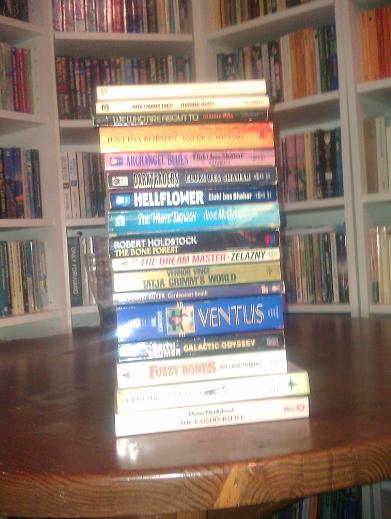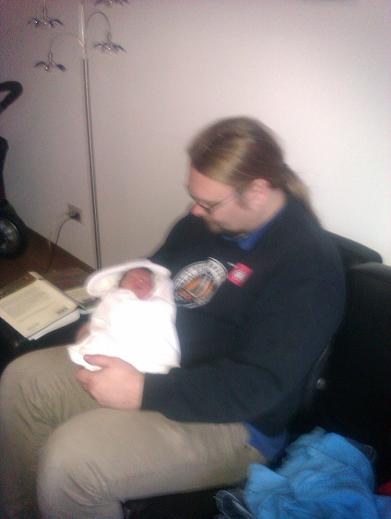And so ends the first month of the last year of the world, if we can believe all those new age hucksters shilling for that supposed Mayan prophecy. I’ll believe it when I see it. Meanwhile this is the start of the fifth year I’ve been doing these monthly roundups, not to mention the eleventh year of my Booklog. Just like happened last year I had to start the new year reading through the backlog of books I’d gotten from the Middelburg library, as I stayed with my parents over Christmas and had gotten more books out than I turned out to be able to read while there — shouldn’t have played so much Colonists of Catan I guess.
I also started a new reading project this month, by working my way through some of Sandra’s favourite books this year. The first of which was Wendy Williams’ Kraken, who in fact left a nice comment at my review, which was appreciated. Not sure which of Sandra’s books I’ll be reading this month, but I’m leaning towards trying one of her gastronomic books, perhaps one of her M. K. Fishers, or a Bemelmans volume, or perhaps Ruth Brandon’s The People’s Chef, which Sandra was raving about a year or so ago.
In the meantime, here are the books I read this month, in order. Eight books in total, mostly non-fiction as I worked my way through that cache of library books.
The King’s Name — Jo Walton
““The first I knew about the civil war was when my sister Aurien poisoned me.” Surely one of the better openings to a fantasy novel and the rest of the book doesn’t disappoint either. Sequel to The King’s Peace.
Giant of the Grand Siècle: The French Army 1610-1715 — John A. Lynn
An indepth look at the French Army and its soldiers during the century that Louis XIV turned France into the most powerful nation in Europe.
Kraken — Wendy Williams
A short, but interesting look at cephalopods — squid, octopussies, cuttlefish, nautiluses — and their importance for medical research, as well as why they’re just cool in their own right. Sandra loved cephalopods and so do I.
War, State and Society in England and the Netherlands, 1477-1559 — Steven Gunn, David Grummitt & Hans Cools
Not entirely succesfull comparative history of England and what we’d now would call the Benelux or Low Countries, during the period which arguably determined the modern shape of both countries.
Mediterranean Front — Alan Moorehead
If journalism is history as a first draft, this is history as second draft: the experiences of Australian war correspondent Alan Moorehead during the first year of the war in the desert in WWII.
The Crisis of the Twelfth Century — Thomas N. Bisson
In the Long Twelfth Century, here defined from roughly 1066 to the early decades of the thirteenth century, Europe went through a crisis of lordship, as every knight with a castle made himself into a lord. Another dense, thick sociological history, interesting but hard going at times.
City of the Chasch — Jack Vance
A classic Vancian novel, set on the mad world of Tshcai and the first in a tetralogy, infamous for its second entry: Servants of the Wankh… I’ve read this a long long time ago in Dutch.
A Year of Battle — Alan Moorehead
The second book in Alan Moorehead’s Africa trilogy, about the second year of the Desert War, now mostly fought between the British and Commonwealth forces against Rommel.

